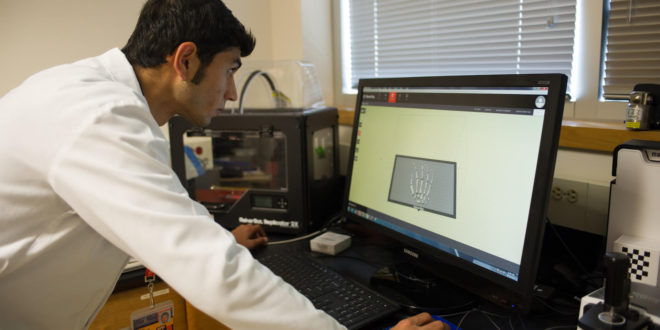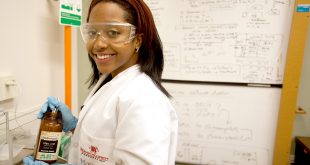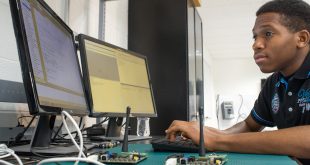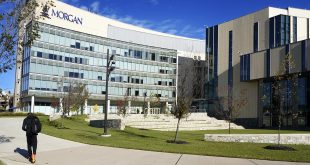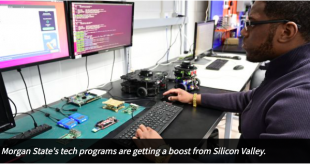NSF and NIH Funding Boosts Morgan’s School of Computer, Mathematical and Natural Sciences
BALTIMORE — Morgan State University’s (MSU’s) School of Computer, Mathematical and Natural Sciences (SCMNS) has announced the receipt of four federal grants totaling more than $1.2 million, awarded in the spring and summer of 2020. The funds are supporting important research in science, technology, engineering and mathematics (STEM) fields ranging from pharmatechnology to advanced computing to meteorology to computer science instruction. Collectively, the grants indicate steady progress toward Morgan’s goal of attaining an R1 (“very high research”) designation from the Carnegie Classification of Institutions of Higher Education. MSU was elevated to an R2 (“high research”) Carnegie classification in December 2018.
“Receiving four grants by four different faculty members testifies to the quality of the faculty and their devotion to the research and education mission of the University,” said Hongtao Yu, Ph.D., dean of Morgan’s SCMNS. “All four faculty members are relatively new to the University, and I am so proud to see them having a great start at Morgan.”
Synopses of the recently funded grant projects follow:
-
- Alexander Samokhvalov, Ph.D., assistant professor of Chemistry at MSU, has been awarded a $326,128, three-year grant from the National Institutes of Health (NIH) to study complexes that slowly release the widely used anti-cancer drug gemcitabine. His research project, “Encapsulation and Delayed Release of Gemcitabine by Aluminum Metal-Organic Frameworks,” is studying aluminum metal-organic frameworks (MOFs) for use as a matrix for drug encapsulation and delayed release. The use of aluminum MOFs in implants offers a promising alternative to traditional chemotherapy for pancreatic cancer, potentially resulting in fewer side effects and greater effectiveness.
-
- The National Science Foundation (NSF) has awarded a $309,418 research grant to Shuangbao (“Paul”) Wang, Ph.D., professor and chair of Morgan’s Department of Computer Science, for his project, “Optimizing Quantum Circuits for Fast Cryptanalyzing Pre-Quantum Encryptions and Securing Post-Quantum Cryptographies.” Commonly used encryption algorithms are considered unbreakable by modern digital computers, however, this may change in the next decade or so because of advances in quantum science. Dr. Wang’s three-year project promotes the progress of science in quantum computing algorithms and cryptologic techniques to improve security of encrypted information, improve national security and prevent adversaries from taking advantage of critical areas of national defense.
-
- A $209,360 grant from the NSF’s HBCU – Excellence in Research Program is funding a two-year project titled, “Planetary Boundary Layer Processes from an Incipient Surface/Upper Air Mesonet Network in the Baltimore-Washington Region,” led by Richard Damoah, Ph.D., lecturer and associate research scientist in Morgan’s Department of Physics and Engineering Physics. Dr. Damoah and his team, in collaboration with Howard University and the University of Maryland, Baltimore County, will launch a weather balloon carrying a radiosonde weather station to collect and transmit data about the Planetary Boundary Layer (PBL) in the Washington, D.C./Baltimore, Maryland/I-95 corridor. Such data are critical for the World Meteorological Organization (WMO’s) monitoring of climate change and for improving weather forecasts. Also, the reusable radiosonde ground station receiving the data will enhance MSU’s climate and environmental programs by supplementing the already established MSU weather station. A central objective of the project is to train students and provide them with experience on instrumentation deployment, field experimentation and scientific research.
-
- Edward Dillon, Ph.D., assistant professor in Morgan’s Department of Computer Science, has also won a grant from the NSF to carry out his project, “Targeted Infusion Project: Infusing Learning Initiatives for Improving the Programming Proficiency of Computer Science Majors at Morgan State University (a Multi-year Initiative).” The project aims to help address the underrepresentation of Blacks, Latinx, Native Americans and Pacific Islanders in computer science and related fields by infusing two new learning initiatives — “problem-solving strategies involving programming” and “a programming tool usage workflow” — into select computer science courses at Morgan. The project will measure student outcomes to study the effectiveness of the learning initiatives and evaluate how they can be scaled-up and transferred to other courses, academic programs and universities. To support the project, the NSF will provide a total of $399,636 over the award period of Sept. 1, 2020 through Aug. 31, 2023.
The four projects foreshadow two objectives of the new strategic plan being developed by Morgan’s leadership, said Willie E. May, Ph.D., vice president for Research and Economic Development at MSU, “(1) to advance Morgan to serve as a premier anchor institution for the City of Baltimore and (2) to achieve the Carnegie R1 Classification (Very High Research Institution) to better position ourselves to take on that anchor institution responsibility. Engagement in this type of research is well-aligned with our designation as Maryland’s Preeminent Public Urban Research University.”
The School of Computer, Mathematical and Natural Sciences comprises five departments: Biology (including the Medical Laboratory Science Program), Chemistry, Computer Science, Mathematics (including the Actuarial Science Program) and Physics (including Engineering Physics). The school also offers three master’s degrees — Bioinformatics, Mathematics and Science (Biology, Chemistry and Physics) — and two Ph.D. degrees: Bioenvironmental Science and Industrial & Computational Mathematics. Its mission is to provide a comprehensive offering of programs that will educate and nurture the next generation of scientists, mathematicians and technologists while advancing the frontiers of science and technology through scientific research and innovation in service to local, regional and global communities.
About Morgan
Morgan State University, founded in 1867, is a Carnegie-classified doctoral research institution offering more than 126 academic programs leading to degrees from the baccalaureate to the doctorate. As Maryland’s Preeminent Public Urban Research University, Morgan serves a multiethnic and multiracial student body and seeks to ensure that the doors of higher education are opened as wide as possible to as many as possible. For more information about Morgan State University, visit www.morgan.edu.
# # #
MEDIA CONTACT(S):
Larry Jones or Dell Jackson, University PR
(443) 885-3022
 Morgan State University Newsroom Morgan State University
Morgan State University Newsroom Morgan State University
